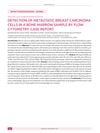 August 2023 in “Drug Design Development and Therapy”
August 2023 in “Drug Design Development and Therapy” Minoxidil may work for hair loss by reducing androgen sensitivity and altering hormone-related enzymes.
 May 2023 in “IntechOpen eBooks”
May 2023 in “IntechOpen eBooks” More research is needed to understand how testosterone is maintained in adult males.
 January 2023 in “Sovremennye problemy nauki i obrazovaniâ”
January 2023 in “Sovremennye problemy nauki i obrazovaniâ” Miliacin may help prevent hair loss and improve hair growth in mice with a condition similar to human baldness.
 October 2022 in “IntechOpen eBooks”
October 2022 in “IntechOpen eBooks” Hair loss due to scarring can be treated by reducing inflammation, removing scar tissue, and transplanting hair. The Follicular Unit Extraction technique is effective but requires skill and time. Future focus should be on scar-less healing methods.

Androgen suppression therapy (AST) doesn't significantly lower bladder cancer risk, but using finasteride, a type of AST, might decrease the risk. AST also lessens the chance of cancer coming back but doesn't really affect survival rates. More research is needed to understand AST's benefits for different bladder cancers.
 November 2012 in “Endocrine Practice”
November 2012 in “Endocrine Practice” Enzymes called 5α-reductases have many body functions and need more research to safely use inhibitors.
June 2009 in “Mayo Clinic Proceedings” A woman was diagnosed with porphyria cutanea tarda and improved with phlebotomy and lifestyle changes.
September 2022 in “Dermatology and therapy” Androgenetic alopecia is linked to heart disease, metabolic issues, and mental health problems.
 32 citations,
January 2022 in “International Journal of Molecular Sciences”
32 citations,
January 2022 in “International Journal of Molecular Sciences” Melatonin, a hormone, can help protect skin from aging by reducing stress, inflammation, and damage, and may also help treat hair loss in women.
 10 citations,
July 2022 in “Dermatology and Therapy”
10 citations,
July 2022 in “Dermatology and Therapy” Melasma's causes include genetics, sun exposure, hormones, and oxidative stress, and understanding these can help create better treatments.
 January 2019 in “Obstetrics & Gynecology International Journal”
January 2019 in “Obstetrics & Gynecology International Journal” Hormonal changes and conditions like polycystic ovarian syndrome are major causes of adult acne in women, with varying prevalence among different ethnicities.
 May 2009 in “Hair transplant forum international”
May 2009 in “Hair transplant forum international” Androgens affect hair growth and shedding, with genetic and non-genetic factors influencing baldness.
 August 2023 in “Journal of Cosmetic Dermatology”
August 2023 in “Journal of Cosmetic Dermatology” Exosomes from hair papilla cells and the Chinese medicine Liao Tuo Fang can potentially promote hair growth and could be used to develop hair growth drugs.
 15 citations,
April 2022 in “Immunology”
15 citations,
April 2022 in “Immunology” Men and women get COVID-19 at similar rates, but men tend to get sicker and have a higher risk of dying, while women usually have stronger immune responses and vaccine reactions.
 8 citations,
December 2022 in “Nature Reviews Endocrinology”
8 citations,
December 2022 in “Nature Reviews Endocrinology” Sex hormones' effects on COVID-19 are unclear and more research is needed to understand their potential as treatment.
3 citations,
June 2017 in “Reproductive biomedicine online” A certain mutation in the fetal alpha 5-reductase gene is linked to a higher risk of late miscarriage.
 2 citations,
October 2021 in “Exploration of targeted anti-tumor therapy”
2 citations,
October 2021 in “Exploration of targeted anti-tumor therapy” Breast cancer hormone therapy can cause hair loss, which can be treated with daily applications of specific topical solutions like minoxidil and hydrocortisone butyrate.
1 citations,
December 2019 in “Frontiers in endocrinology” Higher androgen levels during puberty are linked to shorter adult height in boys with Silver-Russell syndrome.
January 2024 in “Cosmetics” Menopause worsens skin, hair, and nails, affecting self-esteem and quality of life.
 July 2023 in “The Journal of Clinical Endocrinology and Metabolism”
July 2023 in “The Journal of Clinical Endocrinology and Metabolism” Gender-affirming hormone therapy improves physical performance in trans men to the level of cisgender men, while in trans women, it increases fat mass and decreases muscle mass, with no advantage in physical performance after 2 years.
 65 citations,
October 2008 in “Journal of Neuroendocrinology”
65 citations,
October 2008 in “Journal of Neuroendocrinology”  49 citations,
June 1998 in “Journal of Endocrinological Investigation”
49 citations,
June 1998 in “Journal of Endocrinological Investigation” Cyproterone acetate plus ethinyl estradiol is generally more effective in treating hirsutism, but consider side effects and patient characteristics.
 39 citations,
September 2000 in “Obstetrics and Gynecology Clinics of North America”
39 citations,
September 2000 in “Obstetrics and Gynecology Clinics of North America” Insulin-lowering medications show promise for PCOS symptoms but can't be the main treatment yet due to limited long-term research.
 38 citations,
July 2012 in “international journal of endocrinology and metabolism”
38 citations,
July 2012 in “international journal of endocrinology and metabolism” Some plant-derived compounds may help with hormonal conditions, but more research is needed to confirm their effectiveness.
 33 citations,
December 2015 in “Neuroendocrinology”
33 citations,
December 2015 in “Neuroendocrinology” Finasteride treatment changes brain steroid levels and receptors, affecting brain function even after stopping treatment.
 8 citations,
November 2019 in “Dermatologic Clinics”
8 citations,
November 2019 in “Dermatologic Clinics” AGA treatments like minoxidil and LLLLT are safe and effective for gender minority patients.
 7 citations,
May 2016 in “SpringerPlus”
7 citations,
May 2016 in “SpringerPlus” Some breast cancer patients on hormone therapy experience hair loss, and treatments like certain topical inhibitors and supplements may help without harming their cancer prognosis.
 2 citations,
March 2011 in “Infertility”
2 citations,
March 2011 in “Infertility” The conclusion is that lifestyle changes and weight loss are first-line treatments for infertility due to anovulation, with various medications and assisted reproductive technologies as additional options.
 May 2023 in “The journal of sexual medicine”
May 2023 in “The journal of sexual medicine” Ovarian Hyperthecosis caused hypersexuality in an older woman and was successfully treated with surgery.
 January 2020 in “Mastology”
January 2020 in “Mastology” Flow cytometry was effective in diagnosing metastatic breast cancer in a bone marrow sample.

























